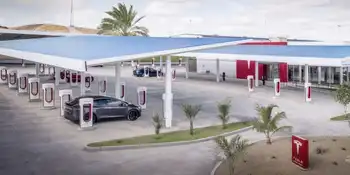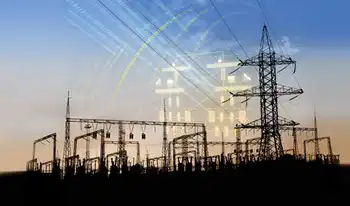Bush urges halt of CO2 emission growth by 2025
By Reuters
Substation Relay Protection Training
Our customized live online or in‑person group training can be delivered to your staff at your location.

- Live Online
- 12 hours Instructor-led
- Group Training Available
While trying to shape global climate change talks in Paris this week and the debate in the U.S. Congress later this year, Bush's cautious approach on global warming falls far short of European goals and lawmakers' proposals.
Bush, who leaves office in January, offered broad principles rather than mandates, and said the coal-burning electric utilities - the biggest single source of U.S. carbon dioxide emissions - need to find high-tech ways of trapping greenhouse gases.
Bush's proposal - aimed at influencing upcoming U.S. debate of mandatory carbon dioxide rules in June - rejects new taxes, abandoning nuclear power and adopting trade barriers.
"If we fully implement our strong new laws, adhere to the principles I've outlined, and adopt appropriate incentives, we will put America on an ambitious new track for greenhouse gas reductions," he said. "We're doing a lot to protect this environment."
The three candidates vying to succeed Bush have made climate proposals that go far beyond his, including a cap on industrial carbon dioxide pollution and an emissions trading system similar to the European Union's.
Environmentalists hope the next president will make Washington a leader in talks to create an international climate treaty to succeed the Kyoto Protocol, which expires in 2012 and which the United States has not ratified.
"People are more interested in hearing details of the presidential candidates' thinking on climate change," said Andrei Marcu of the World Business Council for Sustainable Development.
"Quite frankly, we are looking to the next president for answers, not to Bush," echoed one senior European delegate.
The United States is among the world's biggest emitters of the heat-trapping carbon dioxide emissions that spur climate change, but Bush has opposed setting mandatory caps, citing harm to the U.S. economy and inaction by other major producers like China and India.
Democrats in Congress made it clear that Bush would have a fight on his hands for new environmental legislation, arguing that his plan did not go far enough and that he should embrace a cap-and-trade system similar to that used in Europe.
A Bush aide did not rule that out.
"If it's true that the president's proposal would allow increases in the nation's global warming pollution for the next 17 years, then it's not a plan, it's a joke," said Democratic Sen. Barbara Boxer, who chairs the Senate Environment and Public Works Committee.
Environmental groups sharply criticized Bush's proposal.
"The president is throwing a Hail Mary to polluters in a last-ditch effort to stave off any meaningful action on global warming," said Carl Pope, Sierra Club's executive director.
Independent Sen. Joe Lieberman and Republican Sen. John Warner, who co-wrote the pending climate change legislation, praised Bush's principles and denied it would hurt efforts to pass a bill in June.
The U.S. Chamber of Commerce, which opposes that measure, also backed Bush but said a law does not have to be passed this year, according to Ross Eisenberg, the group's environment and energy counsel.
The White House has said Bush could not back the proposals already before Congress as ways to reach the 2025 goal.
"The wrong way is to raise taxes, duplicate mandates or demand sudden and drastic emissions cuts that have no chance of being realized and every chance of hurting our economy," Bush said.
The United States is alone among major industrialized countries in rejecting the carbon-capping Kyoto Protocol.
Bush also urged governments to adopt their own goals for reductions as well as work together for a "fair and effective international climate agreement."
But his goal to stop growth of these emissions by 2025 is far below what the European Union has sought and the U.N. Intergovernmental Panel on Climate Change has outlined.
By 2020, the European Union plans to unilaterally cut emissions by 20 percent compared to 1990 levels; the cut would go to 30 percent if other rich countries do the same.
The European Union maintains that worldwide emissions must peak within 10 to 15 years from now. By 2050, global emissions must be reduced by 50 percent compared to 1990 levels, and rich countries need to cut these emissions by 60 to 80 percent.
The U.N. climate panel estimates that if carbon emissions peak by 2015, global temperature would increase above pre-industrial levels by up to 4.3 degrees F (2.4 degrees C).
Peaking globally by 2030 would lead to a temperature increase of up to 5.7 degrees F (3.2 degrees C).











